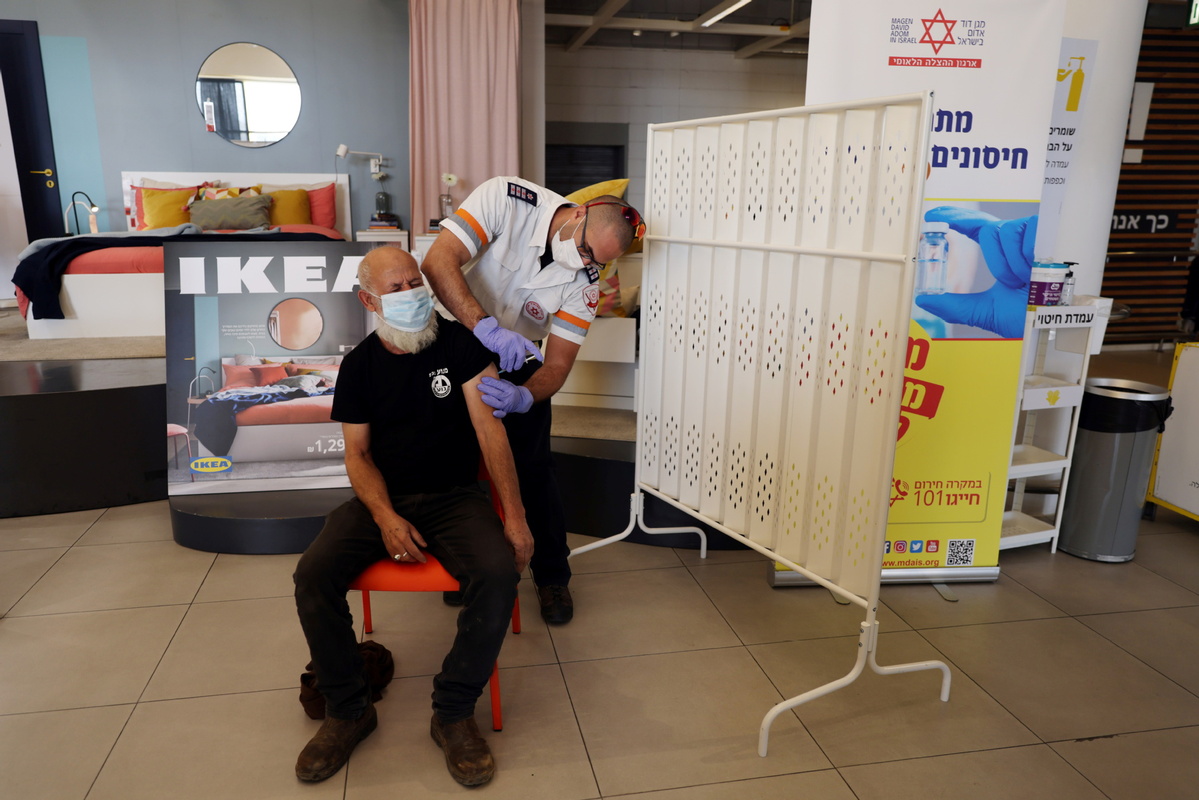Israel example offers hope of pandemic end
China Daily Global | Updated: 2021-02-23 11:18
Lockdown restrictions eased as half of its citizens received inoculation
Israel, which has the highest vaccination rate in the world, has launched its first stage of returning to normal life. The experiment in the country may offer reason for optimism that the pandemic will come to an end.

More than 49 percent of Israelis have received at least one dose since the country's vaccination campaign began on Dec 20. The Israeli health ministry said on Saturday that studies revealed the risk of illness from the virus has dropped 95.8 percent among people who have had both doses of the Pfizer vaccine. It also found that the vaccine was 98 percent effective in preventing fever or breathing problems.
Israel started easing lockdown restrictions on Sunday. Shops, libraries and museums can open, but social distancing and masks are still required.
The country entered its third lockdown on Dec 27 after a virus resurgence.
A number of other facilities are now able to reopen including gyms, hotels, synagogues and tourist attractions. However, these places require patrons to show their "green passports" before entry, verifying that they have already been vaccinated.
The passport, which is contained in an app, is issued by the Israeli health ministry and will be valid for six months, one week after the second dose.
Concerts and sporting events are allowed to reopen at 75 percent capacity with no more than 300 people inside and 500 outside.
However, Israel's airport will remain closed for another two weeks.
Israeli Prime Minister Benjamin Netanyahu said he expects 95 percent of Israelis over the age of 50 to be vaccinated over the next two weeks.
Worldwide, more than 200 million coronavirus vaccine doses have been administered in at least 107 countries and territories, according to an AFP count based on official sources.
Leaders of the Group of Seven economic powers have promised to immunize the world's neediest people against the coronavirus by giving money and precious vaccine doses to the World Health Organization-backed COVAX scheme.
But they were unwilling to say exactly how many vaccines they were willing to share with the developing world, or when.
More than 53 countries in Europe, Asia, Africa and the Americas have received their purchases or donations of vaccines from China.
A Nature poll showed that 89 percent of more than 100 immunologists, infectious disease researchers and virologists working on the coronavirus felt that SARS-CoV-2 will likely become an endemic virus - meaning that it will continue to circulate in pockets of the global population for years to come.
Possible virus eradication
But the scientists said failure to eradicate the virus does not mean that death, illness or social isolation will continue on the scales seen so far. The future will depend heavily on the type of immunity people will acquire through infection or vaccination and how the virus evolves.
More than one-third of the scientists responding to Nature's January survey thought that it would be possible to eliminate the coronavirus from some regions while it continued to circulate in others.
According to a model developed by researchers at the Imperial College London, a vaccine that is 90 percent effective at blocking transmissions will need to reach at least 55 percent of the population to achieve temporary herd immunity as long as some social distancing measures - such as face masks and many people working from home - remain in place to keep transmissions in check.
But if the rate of transmission increases because of a new variant, or if the effectiveness of a vaccine is less than 90 percent at blocking transmission, vaccine coverage will need to be greater to blunt circulation.
Vaccinating even 55 percent of the population will be challenging in many countries. "The virus will stick around if parts of the world don't get vaccinated," said Jeffrey Shaman, an infectious disease researcher at Columbia University, during an interview with Nature.
Some scientists believe that even if the virus remains endemic in many regions, global travel will probably resume when severe infections are reduced to levels that health services can cope with, and when a high proportion of people who are vulnerable to severe illness have been vaccinated.
All India Institute of Medical Sciences Director Randeep Guleria has warned that herd immunity is very difficult to achieve in India as new strains of the virus emerge. Guleria said that at least 80 percent of people need to have antibodies for the whole population to be protected against the virus.
Even with the pace of vaccinations accelerating in some parts of the world, new variants of COVID-19 are rapidly spreading and challenging vaccines. Major global vaccine manufacturers have begun researching and updating to combat the new virus strains.
























